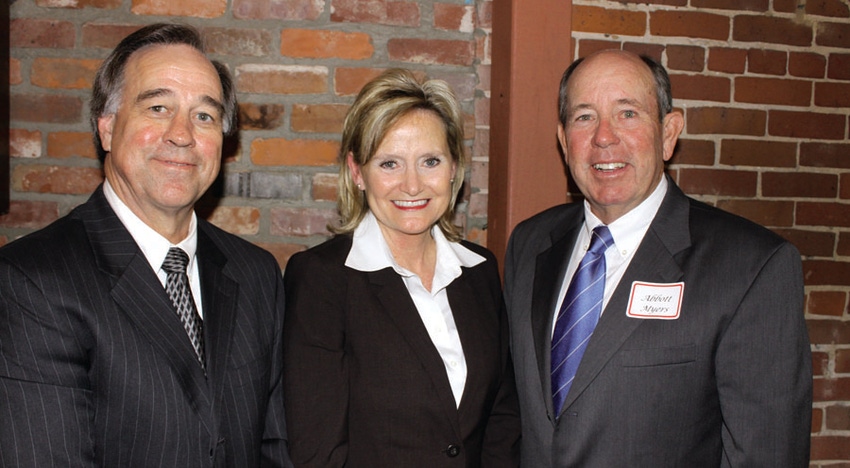
"Agriculture and manufacturing are the two bright spots in the economy right now,” says Abbott Myers, chairman of Mississippi Land Bank and a rice/soybean/corn producer at Dundee, Miss. But, he says, the growing federal deficit, the likelihood that Congress will eliminate direct payments and other farm program funding, the potential for interest rates and inflation to increase, and continuing higher costs for farm inputs pose challenges to farmers.

With good crops and good prices in 2011, many Mississippi farmers were able to pay off or substantially pay down loans, says Abbott Myers, chairman of the board of Mississippi Land Bank.
“We had a lot of loan payoffs, and a number of land sales that might otherwise have been financed were done on a cash basis,” he said at the bank’s annual stockholder meeting. “While it meant a little less business for us last year, we’re happy to see farmers strive and succeed and do well.
“Agriculture and manufacturing are the two bright spots in the economy right now,” said Myers, a rice/soybean/corn producer at Dundee, Miss. “Grain prices have been tremendous the last two years, livestock prices are finally going up, dairy prices are up, everything looks pretty good, price-wise. It’s being said that we’re in a golden age of agriculture right now.”
But, he says, the growing federal deficit, the likelihood that Congress will eliminate direct payments and other farm program funding, the potential for interest rates and inflation to increase, and continuing higher costs for farm inputs pose challenges to farmers.
“There is a lot of uncertainty. It’s hard to tell what’s going on in Washington with regard to the new farm bill. It looks like it’s meeting a slow death by a thousand cuts, and the farm bill we know today won’t be there in the future. It looks like all direct payments will be gone, and the farm bill will be basically an insurance program.”
While the Federal Reserve insists inflation is minimal, excluding food and energy prices, “They don’t farm,” Myers says. “Evidently, they don’t buy diesel either — fuel prices are going through the roof. Seed, feed, fertilizer, all input prices are going up. Even though we’re getting higher prices for our commodities, inflation has been rampant for input prices.
“Interest rates have got to go up at some point. With the federal budget deficit seemingly out of control, when the economy turns around interest rates will have to rise. It’s just a question of when. I personally think by December we’ll see an uptick in rates, and I’m afraid they’ll start higher and go up higher than most people think.
“Everything that happens in Washington affects agriculture,” Myers says. “Federal Reserve Chairman Ben Bernanke said a few days ago that the U.S. economy is now challenged by three factors: high unemployment, continued weakness in the housing sector, and higher levels of household debt. The outlook for the economy is ‘very fragile,’ he said.”
Adhering to budget critical
Consumers “are doing much better job of managing their money than the federal government is doing managing our money,” Myers says. “Our federal deficit is out the roof. Last year, our budget was $3.7 trillion, this year it’s over $4 trillion; the deficit last year was $1.65 trillion, and it will be more this year. We’ve yet to see a true figure. This is way too much.
“The politicians say, ‘It’s so hard to cut the budget — we just can’t do it.’ We in farming have budgets; businesses have budgets; most states have budgets, consumers have budgets.
“I don’t see anything hard about the need for the U.S. to have a budget and to follow it. It’s a reality that almost everyone can grasp — except the politicians in Washington. The federal government is going to have to bite the bullet and get a handle on this. If they don’t, it’s going to affect agriculture directly.
“It makes no difference if you’re Democrat or Republican — this affects everyone in a very definite way. We’ve got to get a handle on this problem.”
Skyrocketing energy prices continue to be a drag on the economy and a major concern for agriculture, Myers says.
“Our nation’s energy policy — what policy there is — needs some common sense. The U.S. and agriculture economies have been built on relatively cheap energy. And while green is good — we need wind, we need solar and thermal, we need new forms of energy — we also need to better utilize natural gas, coal, liquefied natural gas, and traditional energy forms.
“With the big surge in natural gas production in the U.S. and falling prices, we’re being told that more trucks will be running on liquefied natural gas instead of diesel. We have the largest supply of natural gas in the world, and we’ve found more oil in the U.S. than we’d ever thought possible 10 years ago. We need to get on the ball and develop common sense energy policies to take advantage of these resources right here in our own country.”
The international financial crisis also is a concern, Myers says. “Is the U.S. heading down the same road as Greece, facing financial default? The International Monetary Fund chief has called on the U.S. for $500 billion to help bail out the European nations. But if the U.S. can’t get its financial house in order, who’s going to come to our aid? We don’t want to go the way Greece is going. Democrats and Republicans need to get together and get this straightened out.”
Grain production outlook
There are forecasts, Myers says, that agricultural exports will slow next year, that world supplies will build, and grain prices will go down.
“If we look at the growth in world grain production, most of our competition lately has come from South America. But our next major competitor looks to be the Ukraine. The Russian economy has been booming, and a lot of that surplus money is being channeled into agricultural production. The only downside for them is that their weather is very erratic. We all remember past grain shortages in Russia as a result of weather disasters.”
Good crop prices in recent years have also brought sharp increases in land prices, Myers says.
“In my area of the Delta, in the past 14 months, farmland has gone up over $1,000 an acre, and land rents are up $100 per acre. In the Midwest, rents are running $300 to $400 per acre, and I’ve heard as high as $500 in some places in Illinois. These kinds of increases are unheard of. I don’t see how such prices can be sustained with the potential for grain prices to go down.”
In the next 20 years, Myers says, projections are that world food production will need to double in order to meet the needs of population growth.
“It seems we’re producing at the maximum now, but we’re going to have to do a lot more. How we will accomplish it is an awesome challenge.
“I think agriculture has a strong future, but we need to be wary of three things: inflation, rising production costs, and the overreaching of government, which we’re seeing on every hand.”
Mississippi Land Bank “is in a strong capital position to meet the lending needs and growth in the area we serve,” Myers says.
“We’re so excited about the future of agriculture — it’s a wonderful time to be in this business. We know there are obstacles ahead, but we’re confident that Mississippi and American farmers will continue to overcome these problems and meet the challenges that arise.”
About the Author(s)
You May Also Like



